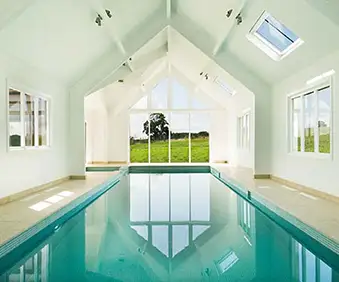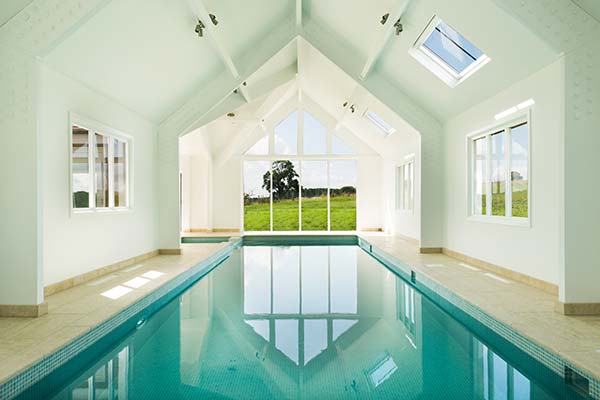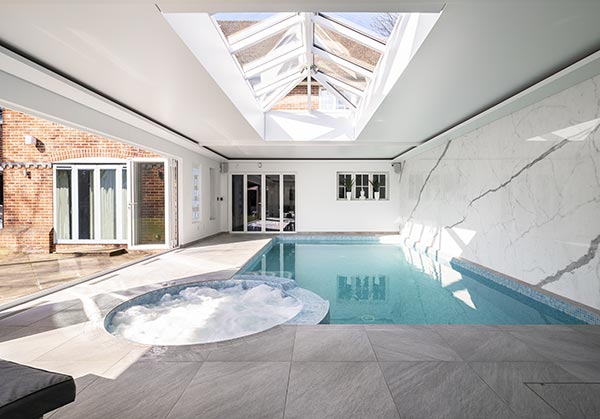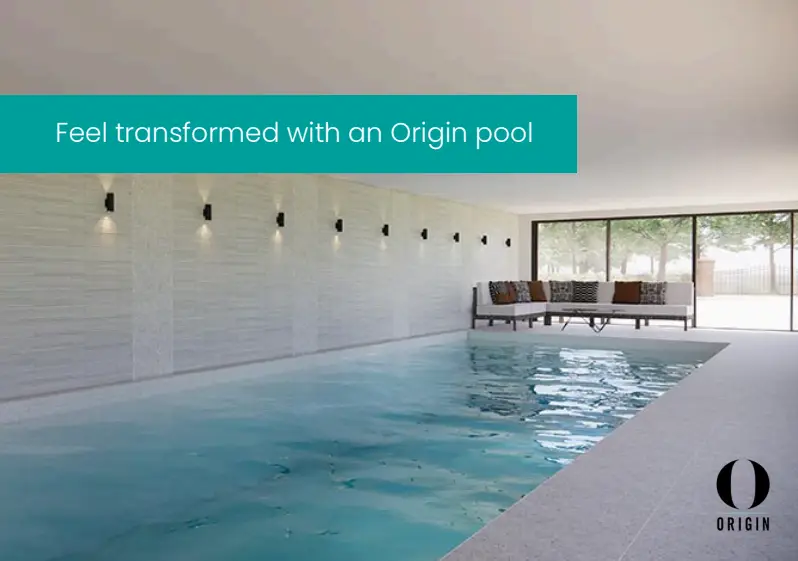For those investing in an Origin indoor swimming pool, water quality is paramount. Proper chemical management ensures crystal-clear water, a hygienic environment, and the longevity of your pool’s components. At Origin, we engineer every pool with precision, ensuring the best water management system is chosen from the outset. Here’s everything you need to know about keeping your indoor pool water clean and perfectly balanced year-round.

Choosing the Right Dosing System
Your pool’s dosing system should be specified at the design stage to prevent issues down the line. Certain materials, such as the pool cover roller and heat exchanger, require specific treatments to prevent degradation. Without proper planning, corrosive elements in the water can damage your pool infrastructure, leading to costly repairs.
Chemical Treatment Options for Indoor Pools
While salt water chlorination is a popular option for outdoor pools, we generally advise against using it for indoor pools. Here’s why:
- Corrosive Atmosphere – Salt can create an aggressive environment that, if not controlled by advanced air handling systems, will corrode metal components in the pool hall over time.
- Hidden Damage Risks – Corrosion doesn’t just affect visible components; concealed fixings and fittings may deteriorate unnoticed, leading to structural integrity concerns.
- Best for Outdoor Pools – The open air allows the corrosive nature of salt to dissipate naturally, making it much better suited for outdoor pools.
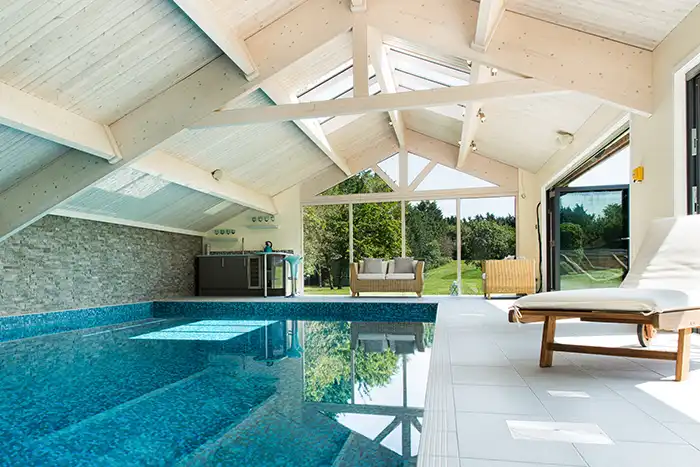
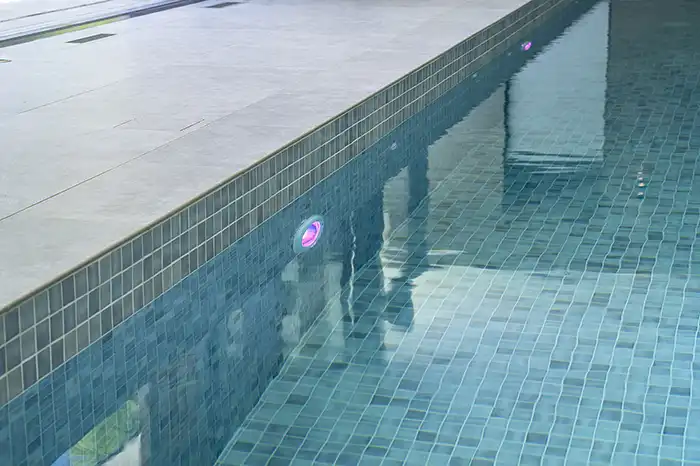
Chlorine remains a reliable choice for sanitizing pools, but it comes in different forms, each with its own considerations:
- Stabilised Chlorine (Tablets and Granules) – This contains cyanuric acid, which protects chlorine from UV degradation. It’s ideal for outdoor pools exposed to sunlight, but less suitable indoors. Cyanuric acid builds up in indoor pools where there’s no UV to deplete it, potentially reducing chlorine’s effectiveness over time.
- Liquid Chlorine – This contains no cyanuric acid, making it a better fit for indoor use, particularly in hydrotherapy or commercial settings where rapid response to changes in water conditions is required. However, its liquid form also brings hazards such as potential for spills and vapour release, requiring careful handling and storage.
- Skin Irritation Risks – Incorrect dosing remains the leading cause of discomfort for swimmers, making precise control essential.
At Origin, bromine is often our recommended solution for indoor pool water treatment:
- Superior Stability – Bromine maintains its efficacy better in warm water and fluctuating conditions, making it ideal for private indoor pools where usage patterns vary.
- Gentler on Skin – Less irritating than chlorine, bromine ensures a more comfortable and luxurious swimming experience.
- Best for Indoor Conditions – Because bromine isn’t affected by UV in the same way as chlorine, there’s no need to manage cyanuric acid levels indoors.
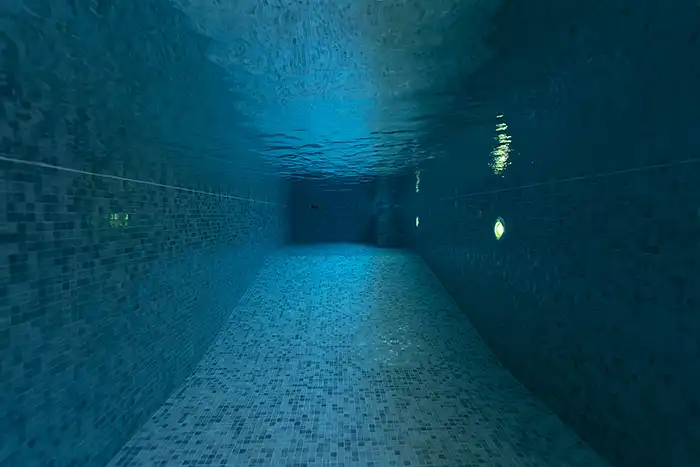
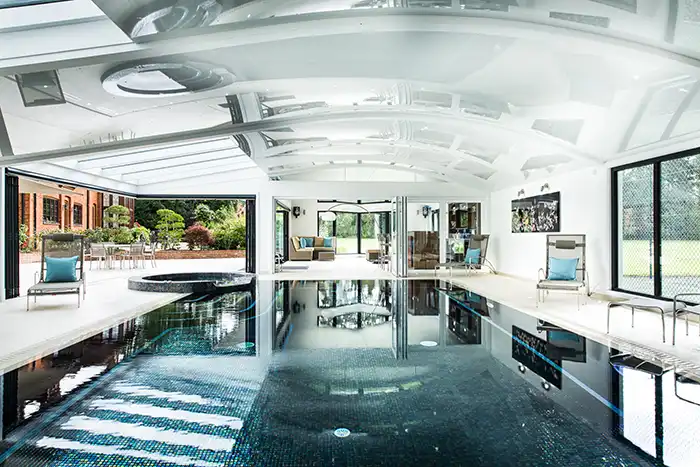
For hydrotherapy pools and hydro spas operating at elevated temperatures, bromine is often the best choice due to its stability in warm water. The Importance of pH Balance Regardless of the sanitization method used, maintaining proper pH is non-negotiable:
- Enhanced Efficiency – Chlorine and bromine are only effective within optimal pH ranges.
- Water Clarity – Balanced water should be crystal-clear and visually pristine.
- No Strong Odours – A well-maintained pool should have minimal detectable chemical smell.
Manual vs. Automatic Dosing Systems
Many pool owners ask whether to go manual or automatic. Automated systems reduce day-to-day maintenance, but we always recommend regular testing, particularly before swimming. The best systems are tailored to your usage, pool volume, and the materials used in its construction. Our team at Origin can help specify the ideal setup to match your lifestyle.
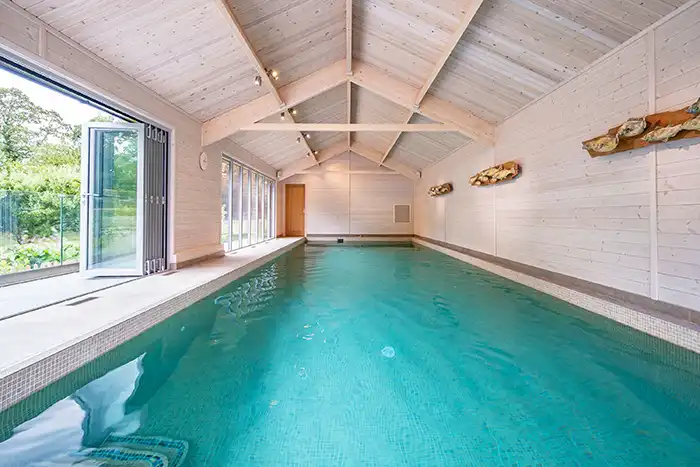
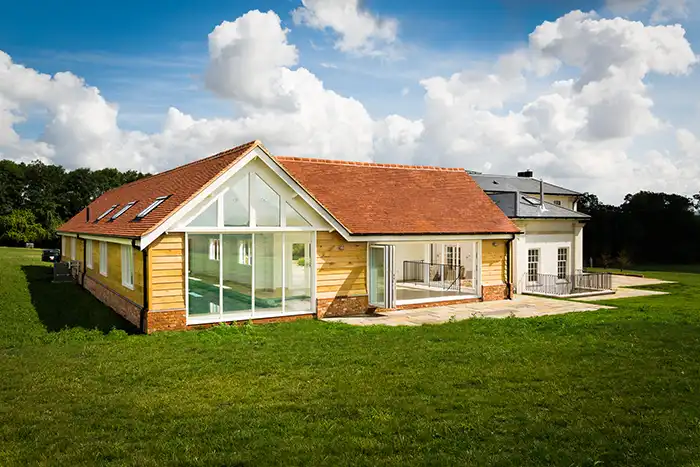
Why Choose Origin Pools?
At Origin, water management is not an afterthought—it’s engineered into every detail. We select only the most suitable systems for your unique pool environment, materials, and usage preferences. Whether you opt for bromine’s stability or chlorine’s reactivity, we ensure everything is designed for effortless performance and minimal stress. You’re not just buying a pool—you’re investing in 40+ years of expertise, world-class engineering, and a commitment to flawless execution. When only the best will do, Origin delivers.
Ready to Design Your Dream Pool?
For personalised advice on water treatment systems and to begin your journey with Origin, speak with our team today. Call us on 01895 823366 or email info@originpools.co.uk - we’ll be happy to guide you through the next steps
- Swimming Pool Water Chemistry & Treatment Guidelines
- CDC (Centers for Disease Control and Prevention) - Healthy Swimming
Guidance on safe pool water chemistry and chlorine/bromine levels.
Link: https://www.cdc.gov/healthywater/swimming - PHTA (Pool & Hot Tub Alliance)
Industry best practices for maintaining pool water chemistry.
Link: https://www.phta.org
- CDC (Centers for Disease Control and Prevention) - Healthy Swimming
- pH Balance & Pool Water Quality
- NSPF (National Swimming Pool Foundation) - Water Chemistry Basics
Detailed breakdown of pH levels, sanitization, and water testing.
Link: https://www.nspf.org - Swim England – Pool Water Treatment Advisory Group (PWTAG)
UK-based authority on pool water treatment, especially for indoor pools.
Link: https://www.pwtag.org
- NSPF (National Swimming Pool Foundation) - Water Chemistry Basics
- Air Handling & Indoor Pool Environments
- ASHRAE (American Society of Heating, Refrigerating and Air-Conditioning Engineers)
Best practices for indoor pool ventilation and air quality.
Link: https://www.ashrae.org
- ASHRAE (American Society of Heating, Refrigerating and Air-Conditioning Engineers)
- Chlorine vs Bromine & Alternative Sanitizers
- EPA (Environmental Protection Agency) – Chlorine & Bromine Regulations
Health and environmental safety guidelines on pool sanitization.
Link: https://www.epa.gov - NSPF (National Swimming Pool Foundation) - Bromine vs. Chlorine
Comparative effectiveness of chlorine and bromine in swimming pools.
Link: https://www.nspf.org
- EPA (Environmental Protection Agency) – Chlorine & Bromine Regulations
- Swimming Pool Materials & Corrosion Resistance
- Lennox - Effects of Saltwater on HVAC & Indoor Air Quality
Why saltwater can be corrosive to indoor pool environments.
Link: https://www.lennox.com
- Lennox - Effects of Saltwater on HVAC & Indoor Air Quality


 Locations Covered
Locations Covered
